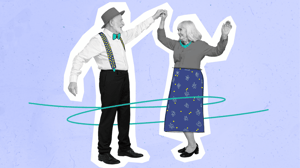The process of ageing has always intrigued humankind, a source of profound reflection amongst the intellectuals of every era, from ancient Rome to the present.
As early as 44 B.C.E., Cicero, in his De Senectute (On Old Age) offered practical advice on how to preserve one's health and vitality, introducing, with extreme foresight and far ahead of its time, the contemporary concept of “healthy ageing”. What emerges from the work of the Roman philosopher is the central role that the individual plays in the ageing process. It is an extremely contemporary concept, and it is the subject of our modern debate about the ways in which we can experience and deal with ageing.
What does “healthy ageing” mean?
It has been in recent years, in fact, that concepts of healthy ageing, or active ageing, have taken on ever greater importance in the debates revolving around the health and well-being of older people. But what, exactly, is meant by these phrases?
The World Health Organisation (WHO) defines active ageing 1 as “the process of optimising opportunities for health, participation and security in order to enhance quality of life as people age”. From this standpoint, it is not only longevity as an absolute value that is important, but also vitality, meaning full participation in society.
The WHO estimates that, in Europe, by 2024, we will be witnessing a significant demographic shift, with the population over the age of 65 outnumbering those younger than 15. This transition inevitably presents new challenges, which require a careful and informed approach to the topic of ageing.
Proprio negli ultimi anni, infatti, i concetti di healthy aging, o active aging hanno assunto una rilevanza sempre maggiore nei dibattiti sulla salute e sul benessere delle persone anziane. Ma cosa si intende esattamente con queste espressioni?
The WHO’s recommendations
Our contemporary context is characterised by a constant increase in average life expectancy, but this is not accompanied by a corresponding rise in quality of life. It is therefore inevitable that we reflect on the concept of healthy ageing, both as it applies to individual well-being and, most importantly, so as to reduce the impact that an ageing population has on state coffers.
Well-being is the key to improving quality of life. Extending the number of years we can hope to live offers us invaluable opportunities, but much depends on how we deal with ageing. Living out these “extra years” in good health, as active community participants, not only enriches our individual experience, but also strengthens the fabric of our societies. On the other hand, if these “additional years” are marred by health problems, social isolation or a loss of independence, the consequences become extremely negative, impacting both the individual and society as a whole 2.
Although the health condition of older people is heavily impacted by the life-style they adopted in their youth and during adulthood, the importance of physical activity and quality of diet during the later stages of life must not be underestimated. These elements play a fundamental role in the health, well-being, functional capacity, mobility and independence of older people.
In fact, ageing healthily goes beyond a simple absence of illness; it means maintaining good functional capacity. The approach put forward by the WHO envisions health as a complex balance between lifestyle, physical activity and diet, even in older age.
In its report "Promoting physical activity and healthy diets for healthy ageing in the WHO European Region” 3, the WHO underscores the importance of “healthy ageing", pointing to physical activity and a balanced diet as key elements for the prevention of non-communicable diseases, such as heart disease, cancer, diabetes, mental health problems, etc.
The WHO recommends three actions for improving one’s health:
- Healthy diet: Diets high in fruits and vegetables and low in ultra-processed foods containing large amounts of sugar, salt and saturated fats are recommended. The Mediterranean diet is a good example of such a diet.
- Physical activity: Meeting the WHO guidelines of at least 150 minutes per week of moderate physical activity reduces the risk of all-cause mortality by 28%. In addition, other activities that help to maintain balance and mobility and reduce loss of muscle mass and bone density are highly recommended.
- Active lifestyle: In a comparison of adults in the same age bracket, engaging in even higher levels of physical activity can reduce the risk of all-cause mortality by up to 35%. In summary, embracing an active lifestyle has shown itself to be a fundamental strategy for extending longevity and improving life expectancy.
Creativity, mental health and longevity
In the context of promoting healthy ageing, it is crucial to underscore the importance of art and culture to the physical and mental well-being of older people.
A recent study by University College London (UCL) 5, summarised in an article by Catterina Seia, highlights the way in which participation in cultural activities and initiatives intended to encourage creative expression are often linked to improved mental health, decreased chances of developing dementia and even greater longevity. Active participation in cultural and artistic activities not only improves one’s emotional state, but it also has a positive impact in terms of social interaction and mental stimulation.
Cultural and artistic initiatives in the community thus act as effective means of maintaining vigorous intergenerational ties and fostering a positive view of ageing, as a process offering a wealth of experiences and opportunities.
The role institutions play in healthy ageing
The situation we have outlined here, which sees the individual and their personal way of approaching ageing as playing a key role, certainly requires some support from our institutions, in particular in terms of helping to spread a culture of healthy ageing.
Dr. Kremlin Wickramasinghe, the WHO/Europe Regional Adviser on Nutrition, Physical Activity and Obesity, urges us to rethink the common conception of life after 65 as being inactive and sedentary. Underscoring the importance of a change in perspective, he encourages decision-makers, businesses and communities to create more opportunities to improve the health and well-being of older people, promoting an active, healthy and engaging lifestyle.
Action on the part of institutions is of vital importance if we are to put the WHO’s recommendations into practice. Such organisations can play a vital role in creating community environments that encourage a stimulating lifestyle for older people, providing dedicated spaces for physical activity, cultural programmes and support services. Furthermore, collaboration with the private sector can make it easier to implement business policies focused on the health and well-being of older people, fostering inclusive and sustainable work environments.
IBSA Foundation and the Cultura e Salute project
IBSA Foundation has always adopted an innovative perspective when it comes to scientific knowledge and research. The Foundation promotes the dissemination of scientific information through the use of accessible language and through projects that link science and culture. IBSA Foundation firmly believes that these two spheres, acting together, can bring benefits that go beyond healthcare, having a positive impact on people's lives.
One of the Foundation’s most important projects based on this philosophy is Cultura e Salute (meaning Culture and Health), an initiative promoted by IBSA Foundation in collaboration with the City of Lugano Cultural Division. Based on a growing body of scientific and clinical evidence, including from the WHO, the project aims to foster synergies between the spheres of culture and of health in order to improve the quality of life and the well-being of people in care facilities, in arts spaces and in everyday life.
Cultura e Salute does more than simply bring scientific and humanistic knowledge together; it also offers tangible proof of the way in which art and culture can be viewed as genuine therapeutic treatments based on scientific principles.
The project places a strong focus on organising Forums and conferences that are open to the public. These events, featuring renowned experts and speakers, provide valuable opportunities to present the latest scientific evidence and best practices at national and international levels, focusing on the intersection of culture and health.
Recent examples include "Culture and longevity", an event dealing with the beneficial connection between the two title concepts, held in Zurich in 2023, and "New Frontiers in biological and environmental determinants of aging", which was held in Bellinzona during the same year.
IBSA Foundation’s commitment does not end there. It is currently planning a forum due to take place in Naples on 18 April, entitled "New frontiers in cancer and healthy aging”, a new chapter for the dissemination within the scientific community of knowledge on ageing and on the development of different types of cancers.
Bibliography
[1] Definizione di Healthy Aging, fonte PAHO (Pan American Health Organization)
[2] UN Decade of Healthy aging Plan of action 2021-2030
[3] WHO Report on healthy ageing
[4] IBSA Foundation - Get inspired. Culture: a driver for health and wellbeing in the EU
[5] Rapporto UCL, The Impact of Arts and Cultural Engagement on Population Health




